17 Foods High in Arginine
Arginine also referred to as L-arginine, is an amino acid, which your body makes. It is not an essential amino acid (e.g. a one that your body cannot produce) but we still get some from foods. Arginine may alleviate various symptoms, ranging from inflammation to migraines.
Why do you need arginine?
People need arginine because it has cardiovascular benefits and relaxes the blood vessels.
Research shows that it can provide relief from angina and peripheral arterial disease. It seems to improve the health of individuals suffering from cardiac disease. When combined with other supplements, such as pycnogenol, it can also act as a cure for erectile dysfunction. Some studies have proven its immunity-boosting effects. This nutrient can also fight the symptoms of weight loss caused by HIV.
It has been known to assist kidney function after a transplant and also alleviates symptoms of kidney inflammation. Studies show that it can ease migraines, improve recovery time after surgery and relieve hypertension (1, 2, 3, 4).
The use of L-arginine as a sports and body building supplement is quite popular. Several studies have shown the positive role of L-arginine in boosting stamina, physical endurance and muscular gains. It is believed to help improve physical growth due to its ability to increase growth hormone release and due to its positive effect on nitric oxide levels. The increase in nitric oxide, in turn, helps improve the supply of blood to the muscles leading to a substantial improvement in growth (5, 6, 7).
The trend of consuming arginine as a supplement is on the rise. However, most people appear to get an adequate amount of arginine from foods and might not get much benefit from supplements.
But in some cases, doctors and nutritionists may recommend supplemental arginine.
Individuals with protein malnutrition, infections, burns, and other conditions may require arginine supplementation.
There is no established standard dose of arginine but most doctors recommend a daily intake of 1 200 mg.
Your required daily intake varies from person to person depending upon conditions. Professional athletes may need up to 20 g of arginine per day.
Ask your doctor for advice if you want to know how much arginine you need and/or if you are considering taking arginine as a supplement over an extended period of time.
Can arginine be dangerous?
Excess of arginine in the body may result in adverse effects. Possible adverse effects include bloating, diarrhea, abdominal pain, and gout. In asthma patients, it may cause a worsening of breathing (8).
Adding some arginine-rich food to your diet is a good way to increase your arginine intake.
Here is a list of 17 foods, rich in arginine, you should eat regularly.
Turkey
Turkey is the main attraction at any Thanksgiving feast. This fowl meat is lean, high in protein and the single best dietary source of arginine. A 100 g serving of turkey meat contains 1716 mg of arginine (9).
It has a low sodium and fat content. Furthermore, it is an excellent source of protein and vitamin B6.
Turkey meat has an overall good nutritional profile.

Turkey is an excellent source of arginine and other nutrients
It contains some high-quality proteins, minerals and vitamins.
As it is also low in fat, turkey has become an essential part of the healthy diet (10).
Risks of consuming turkey meat include obesity, development of prostate cancer, infertility, and hypertension or high blood pressure (11).
Turkey can be roasted whole with a healthy filling for a family dinner or you can use turkey slices to make a sandwich and eat it for a light lunch.
Chicken
Due to its favorable nutritional profile, chicken meat can play an important role as part of a healthy diet for individuals belonging to all age groups.
A 100 g serving of chicken holds almost 909 mg of arginine (12).
It is an excellent source of protein and has low sodium content. It is high in saturated fat, though.
Chicken meat holds high-biological-value protein, vitamin, and low-fat content. Due to its high arginine and protein content, it is an excellent dietary choice for those individuals who want to increase muscle mass without becoming obese (13).
Excessive consumption of processed chicken meat may result in prostate cancer, high cholesterol, and campylobacteriosis (14).
You can incorporate this healthy meat into your diet in several ways. You can roast it for dinner, fry it, make a nutritious soup or make a chicken sandwich.
Shrimp
Seafood also contains arginine. There is 1826 mg of arginine in just 100 g of shrimps (15).
It is also rich in various other nutrients such as niacin, zinc, and protein.
It is low in fat but has high cholesterol content.
Shrimps are a high-quality protein source (16).
But consume them in moderation as they have high cholesterol content (17).
Shrimps are a favorite appetizer at restaurants and parties. They can be grilled, fried with butter with a crunchy coating on top or included in a seafood broth.
Lobster
Another arginine- rich food, lobster contains 1642 mg of this amino acid in a 100 g serving (18).
It is also an excellent source of vitamin B12, pantothenic acid, protein, and zinc. It is low in saturated fat but high in sodium and cholesterol.
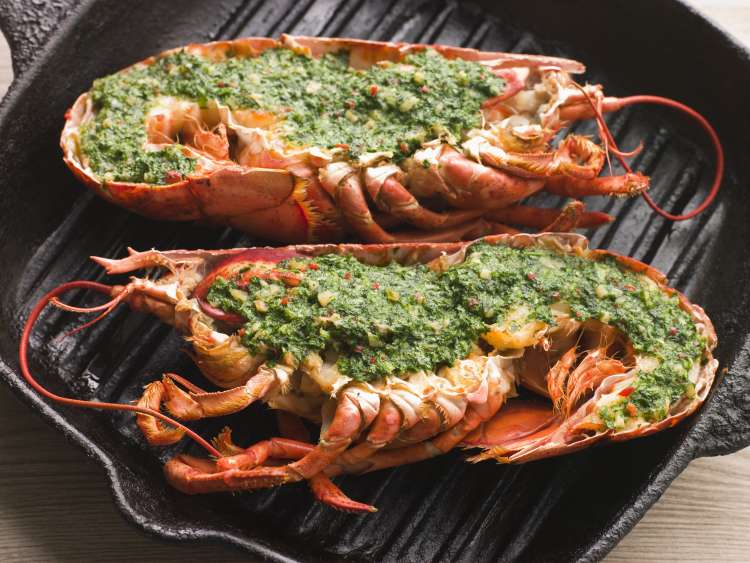
Lobster is rich in arginine, vitamin B12, omega-3 fatty acids and other nutrients
The nutritional benefits of lobster are due to the content of high-quality protein and vitamins (19).
On the downside, lobster may contain contaminants such as mercury and may trigger an allergic reaction in some people (20).
Lobster is expensive but very delicious. You can grill it to make a tasty dish or make lobster bisque with it.
Tuna
A 100 gm serving of tuna contains 1396 mg of arginine (21).
This fish is low in sodium and a great source of protein, omega-3, vitamin A and selenium.
The inclusion of tuna in your diet may help in combating cardiac disorders, depression, obesity, cognitive decline, asthma, cancer and inflammatory diseases. It has excellent nutritional value due to its high-quality protein content (22).
Purchase tuna carefully as there it may result in mercury poisoning (23).
For increasing your arginine intake, eat a tuna sandwich for a light lunch.
Cod
100 g of cod can supply you with 1066 mg of arginine (24).
Besides arginine, this fish is a rich source of vitamin D, niacin, vitamin B6, vitamin B12 and an excellent source of protein. It is high in cholesterol and low in saturated fat.
Cod is beneficial against rheumatism and rickets and many other ailments due to its nutritional content (25).

Cod fish is high in arginine and other nutrients
However, sometimes it may cause mercury poisoning (26).
Fry a few cod fillets for lunch by covering it in a batter of flour and marinating it with lemon juice and spices. You can also grill it and pair it with a side of vegetables.
Pork loin
A 100 g serving of pork loin contains 1449 mg of arginine (27).
It is an excellent source of potassium and riboflavin but is high in cholesterol.
Regular consumption of lean pork meat delivers cardiovascular and metabolic health benefits.
Studies have shown that it may be more satiating than other meats (28).
But use it in moderation as it may cause high blood cholesterol (29).
Roast a pork loin for dinner and pair it with a salad or gravy. You can also make a sandwich with pork slices.
Lean beef
The nutrient profile of beef features 1461 mg of arginine per 100 g serving (30).
This red meat is a great source of phosphorus, protein, niacin and vitamins.
It is low in sodium but high in cholesterol.
As part of a healthy, balanced diet, beef is a rich source of high biological value protein and essential nutrients.
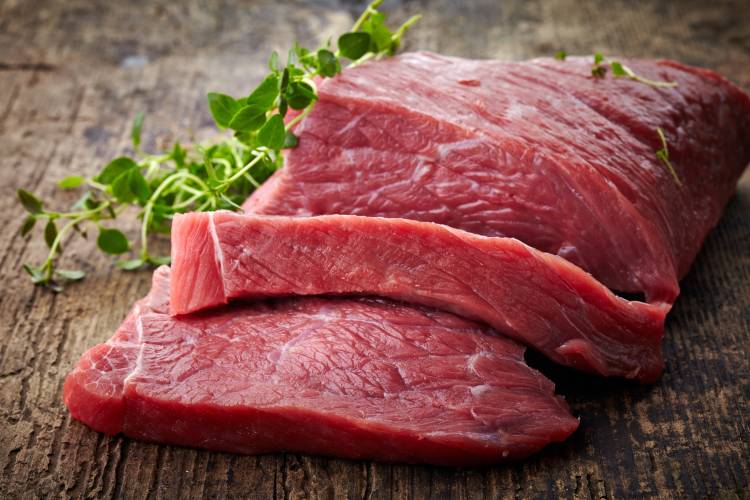
Lean beef is an excellent source of arginine, proteins and other nutrients
It is beneficial in the treatment of anemia and maintaining the health of red blood cells.
It is also useful for the production of hormones and healthy brain functioning (31).
But keep in mind that excessive consumption may lead to cardiovascular disorders, obesity and colorectal cancer (32).
Beef is a commonly consumed food. You can make a beef vegetable stew at home or make a burger using beef patties.
Mollusks
A 100 g serving of mollusks contains 932 mg of arginine (33).
Mollusks are low in saturated fat and a rich source of niacin, protein, phosphorus and potassium.
They are high in cholesterol.
The beneficial properties of these sea creatures include antioxidant, antimicrobial antihypertensive, anticoagulant, anticancer, wound healing, and anti-inflammatory effects (34).
Avoid purchasing contaminated mollusks as they may contain toxic substances such as mercury and other environmental pollutants (35).
Grill a few mollusks and season them with olive oil and add them to a seafood salad.
Soybeans
A 100 g serving of soybeans contains 6670 mg of arginine (36).
Soybeans are an excellent protein, folate, and potassium source and are low in fat, sodium, and cholesterol.
The health benefits of soybeans include prevention of cancer, cardiovascular disease, and osteoporosis, as well as alleviation of menopausal symptoms (37).
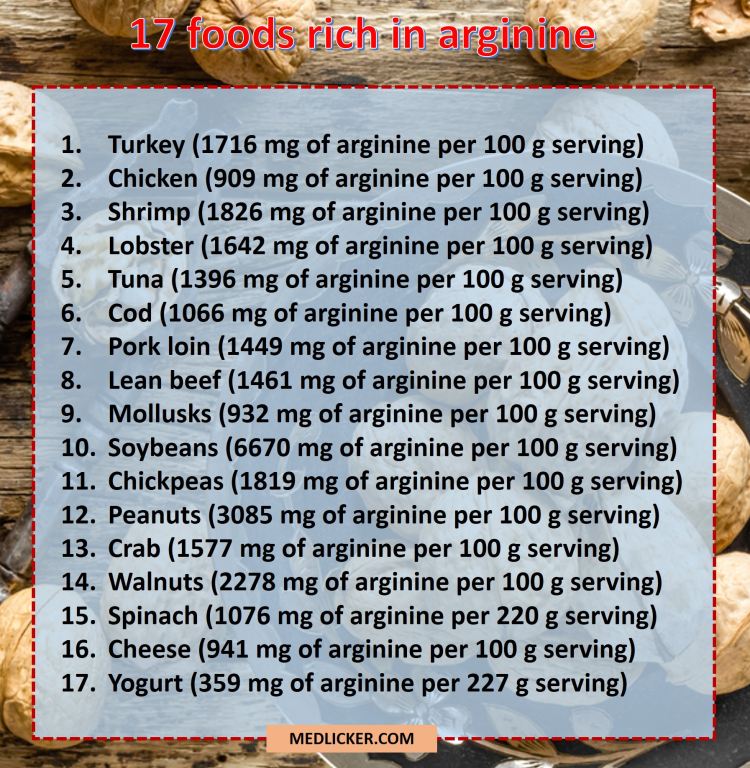
Foods rich in arginine
But consume them with care; the phytoestrogens present in them may impair endocrine function and may cause infertility and promote breast cancer in adult females.
Soy phytoestrogens are potent antithyroid agents that cause hypothyroidism and may lead to the occurrence of thyroid cancer (38).
You can use soybean oil for cooking food.
Chickpeas
Chickpeas contain 1819 mg of arginine per 100 g serving (39).
They are also rich in dietary fiber, protein and copper.
Research suggests that chickpeas play an essential role in weight management and glucose and insulin regulation.
They also have a positive impact on some markers of cardiovascular disease (40).
But chickpeas may contain various antinutritional compounds, including protease inhibitors, lectins, phytic acid, oligosaccharides and a few phenolic compounds that may disrupt the consumption of nutrients by people (41).
You can boil chickpeas and make a chickpea salad or roast them for a healthy, light snack.
Peanuts
The arginine content of peanuts is 3085 mg/100 g serving (42).
Peanuts are an excellent source of manganese, niacin and folate.
Furthermore, they are low in sodium and cholesterol.
Peanuts are a rich source of multiple nutrients and their consumption is associated with health benefits, such as reduced cardiovascular disease risk.
They provide relief from gallstones, hypertension, cancer, inflammation and diabetes.
However, some people may be allergic to peanuts (43).
You can eat peanuts in roasted form as a snack or include peanut butter into your breakfast.
Crab
The meat of this aquatic creature contains 1577 mg of arginine in a 100 g serving (44).
Crab meat is an excellent source of niacin, folate, and potassium. However, it is high in sodium, fat, and cholesterol.
However, it is high in sodium, fat, and cholesterol.
Besides being a rich source of arginine, crab also offers many amazing health benefits, such as a boost in cognitive function, protection from cardiac disease, relief from inflammation, healthier bones, better immunity, improved circulation, and detoxification of the body (45).
On the flip side, it may contain contaminants such as pollutants, toxins, parasites, and heavy metals (46).
You should consume this food moderately, as they are rich in sodium, fat and cholesterol.
You can grill crab whole with a delicious seasoning and pair it with a fresh, zesty salad.
Walnuts
There is about 2278 mg of arginine in a 100 g serving of walnuts (47).
These nuts are low in cholesterol and sodium and are a great source of copper and manganese.
Walnuts are also loaded with fiber and possess wide-ranging cardiovascular and metabolic benefits.
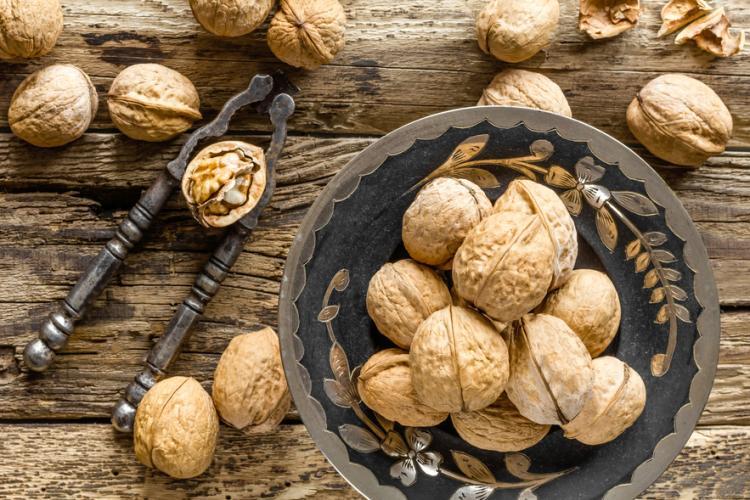
Walnuts are rich in arginine, omega-3 fatty acids and other nutrients
They are useful for type II diabetes treatment and prevention of neurological disorders (48).
They may trigger an allergic reaction in some people (49).
You can eat walnuts in raw, whole form or add them to both savory and sweet dishes as a garnish.
Spinach
A 220 g serving of spinach leaves contains 1076 mg of arginine (50).
This vegetable is an excellent source of protein, vitamin C, and iron. It is high in sodium though.
Compounds present in spinach prevent oxidative stress. Spinach also helps in the treatment of anemia and cardiovascular diseases (51).
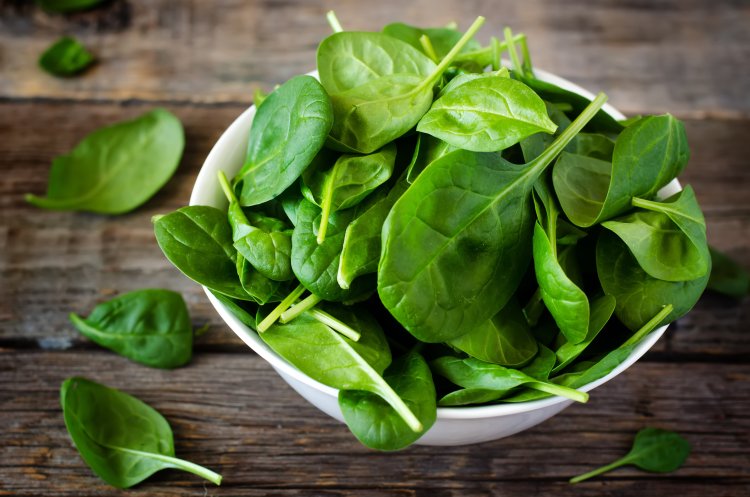
Spinach is rich in arginine and other essential nutrients
Spinach grown on water serves as a route of food-borne illnesses (52).
Boil and cook spinach as the main course.
Cheese
A 100 g serving of cheese contains 941 mg of arginine (53).
Cheese also supplies the body with a significant amount of protein, calcium, and phosphorus.
The inclusion of cheese in the diet makes bones and teeth stronger (54).
Cheese is usually high in saturated fat, which is linked with increased risk for cardiovascular diseases (55).
You can eat cheese in several ways; you can add a slice of cheese to your lunch sandwich or burger or add it to spaghetti or pasta.
Yogurt
The arginine content of yogurt is 359 mg per serving (227 g) (56).
Yogurt is also an excellent source of potassium and calcium.
It contains a lot of sugar.
Consumption of yogurt leads to healthier bones and teeth (56).
Eating of dairy products, such as yogurt and yogurt-based beverages, is associated with lower body fat and lower risk of cardiovascular disease (57).
Avoid excessive consumption of yogurt due to its sugar content (58).
Eat a bowl of plain yogurt with fruit as a healthy snack.
Things to remember
Arginine is naturally produced in the body but some individuals may face a deficiency of arginine. This amino acid is beneficial in alleviating symptoms of cardiovascular disease and improves immunity. It is helpful in curing erectile dysfunction as well.
There is no established RDA for this amino acid but generally, 1200 mg/ day is recommended by doctors.
If you want to take arginine supplements, always ask your doctor for consent first.
However, the best way to prevent arginine deficiency is to eat some arginine-rich foods.
The best source of arginine is meat (beef, poultry and pork).
Most of these foods are also high in cholesterol, so you should tread lightly.
Some kinds of seafood are also an excellent source of arginine, including lobster, crab or shrimps.
However, you should be very careful while eating seafood as there is a risk of an allergic reaction (if you are allergic to them) or mercury poisoning.
Peanuts, walnuts, and soybeans are also high in arginine but these foods may induce an allergic reaction in some individuals so be careful while consuming them.
Dairy products such as cheese and yogurt may also help you increase your arginine intake.
| Written by: | Muhammad Usman, M.D., B.Sc. |
|---|---|
| Education: | Physician |
| Article resources: | See numbered references in the article. |
| Image resources: | Stockphotosecrets.com |
| Published: | April 21, 2017 at 10:45 AM |
| Next scheduled update: | April 21, 2019 at 10:45 AM |
Get more articles like this in your inbox
Sign up for our daily mail and get the best evidence based health, nutrition and beauty articles on the web.

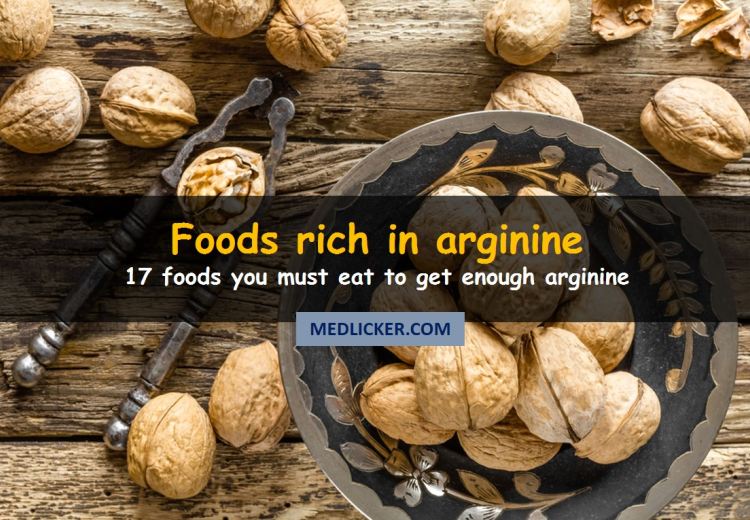
Ache in left arm that you should not ignore
Alkaline water dangers: why you should not drink it
How to Avoid Sleepiness While Studying?
23 Foods That Increase Leptin Sensitivity
Low dopamine (e.g. dopamine deficiency): causes, symptoms, diagnosis and treatment options
Swollen taste buds: the ultimate guide to causes, symptoms and treatment
Thin endometrial lining: causes, symptoms, diagnosis and treatment
Pimples inside nose: the complete guide
Holes in tonsils: definition, symptoms, treatment and prevention
How to deal with an ingrown hair cyst
Allegra vs. Zyrtec vs. Claritin
How to get rid of phlegm (excessive mucus) in throat? Detailed guide to medical and home remedies, symptoms and causes
What causes stomach ache after meals?
Allergy to penicillin and alternative antibiotics
Liver blood test results explained